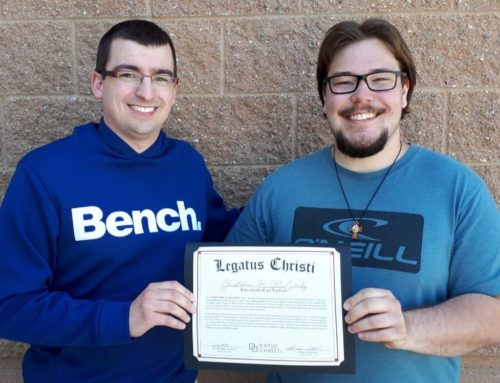A Christian response to Pride month
Dr. Corey Miller
President and CEO of Ratio Christi
June is Pride month. From rainbow images across social media to multicolored decorations adorning your favorite shops and brands, it seems that everyone is celebrating. But how should a Christian respond to Pride month? Can anything be done to present truth in love?
Let’s be honest – Christian treatment of the LBGT+ community has been polarizing. When we speak with truth, we often do it with insensitivity. When we try to speak with love, we often share an impotent Gospel. Is it possible to share the truth with love when it comes to LBGT+ issues?
Throughout Pride month, Ratio Christi will be publishing a series of resources related to LGBT+ concerns and how to communicate truth in love.

It is our hope that this series of blog articles helps to heal the rift between the Christian and LBGT+ community. We plan to address some of the most important issues facing these communities with some of the biggest voices in the apologetics space. Finally, we hope to prepare Christians to share the truth in love. We want to build bridges to share the Gospel, not win arguments.
What is Pride month?
Pride Month is a time allotted for everyone to celebrate the LGBT+ (for short) community and their quest for equality. 2019 is the 50th anniversary of the Stonewall Riots, violent demonstrations in reaction to police raids on gay bars. These spontaneous demonstrations by supporters of the gay community brought national attention to the LBGT+ community. Christians have been struggling to respond ever since.
Pride month on college campuses
Pride Month has grown far beyond the boundaries of its beginnings in NYC. College campuses have become bastions of LGBT+ support (you can check your favorite school’s Campus Pride Index here). Liberal professors outnumber conservative professors 12-1. College campuses even have their own – yes, a second – pride month in April. Campus Pride events urge students to, “Take action against religion-based bigotry.”
For too long, Christians have abandoned the university to this thinking. 77% of university campuses do not have a group sharing the Gospel. Universities – the centers of training the future leaders of the world – lack effective evangelism. How can Christians break through with the Gospel on college campuses in this environment?
The Christian Response
Christians are commanded to communicate truth in love (Ephesians 4:15). We hope that through doing so we will see Christ, who is Truth (John 14:6) and Love (John 4:8). The Gospel message has the power to transform the lives of students and faculty on campuses and subsequently change the world. As goes the university, so goes the culture. As goes the US university, so goes the world.

Our failures
The Christian community has largely failed the LGBT+ as it has lacked truth in love. Our attempts to reach the community are mostly well-intentioned, but still fail in two key areas.
Bash – Brutal and unloving
The bash approach might be represented by the now defunct Westboro Baptist Church whose infamy included holding up signs that “God hates fags.” Some might think that these people told the truth without love, but in reality they didn’t even tell the truth. We strongly disagree with this approach, as do most Christians.
Dash – Silence is not love
The dash approach is not much better. It simply ignores the elephant in the room. Historically, orthodox Christianity has opposed LGBT+ lifestyles. It has cited reasons from Scripture and nature. Traditional Christianity, as a mainstream position, has viewed LBGT+ activity both as sinful and harmful, individually and societally. To say nothing is to fail in loving. One can tell the truth without love, but one cannot love without telling the truth.
A better way
Throughout Pride month we will be offer resources to help you address this topic. We’ll communicate with various audience levels on related topics. We hope to teach you how to best carve between the bash and dash approaches in order to speak the truth in love.
Winning the argument is not enough. As thoughtful Christians, we don’t present well-reasoned arguments for the “Gotcha!” moments. We need to be empathetic, compassionate, and caring as well. We hope that the upcoming resources will prepare you to answer the strongest objections to the Christian position on sexuality as well as ideas on how to present the Gospel to the LBGT+ community.


LGBTQ activty is sinful because it’s harmful. (Not “sinful and harmful”) God does not forbid anything arbitrarily. He is loving and forbids only what is harmful. LGBTQ doesn’t have exclusive rights on sin.
We’re all sinners. Knowing that, we are expected to be respectful one sinner ot another; to love one another as He loves us. Love does not mean affection– it can result in affection but not necessarily so. Love means to look to the well-being another. Vacinating a child, amid screaming and crying is an act of love, but not affection. The medical and social science records attest to the serious, multiple and life-shortening risks of LGBTQ activity. God forbids it as a loving act. It’s meant to keep those who are so tempted from harm.
b
The best answer: Do not waste your time on this issue. They know where we are. But they do not know that the Bible is the word of God, factual, with an incontestable authority and a message they must hear and believe in order to be delivered from their situation. Trouble is, the church has failed and continues to fail in convincing unbelievers that “faith comes by hearing and hearing by the word of God.
Paul said this in reference to the old testament which is loaded with predictions, the fulfillments of which are very easily proven. Be it the destruction of Tyre, the Passover (60,000 MEN) who witnessed it, Joseph’s weather forecast and the crucifixion of Jesus … just to name a few. But Christian apologists rarely bring forth the proof. Get with it RC!